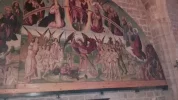It is still my understanding that the violation of these forum rules happens when the discussion gets personal or comments are interpreted as an attack on the beliefs or non-beliefs of others.
I find it beneficial to
learn about the religious beliefs of other faiths. For example, we've all probably learnt at school that you could buy indulgences once and now you can't anymore. That was the extent of my knowledge about partial and plenary indulgences. I probably learnt only through this forum and assorted links that plenary indulgences are alive and well, so to speak.
Which brings me to a question in view of the Jacobean Jubilee Year 2021. When exactly can you get a plenary indulgence in the Cathedral of Santiago? Not the conditions for it, just the date(s). I think it is every day of 2021, as it was every day of 2016 but 2016 was not specific to Santiago; that was a global option.
So let me rephrase: When is it possible to obtain a plenary indulgence specifically and only in Santiago?
If I may end with a bit of humour to make a connection to the original question: After all, we don't want a paid proxy carry someone else's sins to Santiago in vain.

Short answer, from 12:01 AM on 1 January 2021, until 11:59:59 on 31 December 2021. This is the WHEN of the Plenary Indulgence, the entire year 2021.
To learn more about the indulgence, where and how it can be obtained, read on...
You have already stated the
WHERE.
To clarify on the
WHAT and
HOW, here is what the Pilgrim Office website states:
WHAT - What is the Holy Year (2021)?
"The Holy Year or Compostela's Jubilee Year is a time in which the (Roman Catholic) Church grants special spiritual graces to the faithful, in imitation of what the Bible says about the Jubilee Year of the Israelites:
Every 7 years was a Sabbatical Year, in which he recovered the lands who had sold them out of necessity and the slaves acquired freedom. Every 50 years was Jubilee Year (Lv, 25) .
Jesus says that He comes to announce a year of the Lord's grace (Lk 4:16).
The Church of Compostela, with its Holy Year, also grants a special year of grace."
NOTE: This occurs every Holy Year - these years occur when the Feast of the Apostle Santiago falls on Sunday. Thus, the indulgence may be available at Santiago de Compostela on a schedule different with the rest of the Church.
HOW - "To win the Jubilee (Plenary Indulgence) it is required:
- Visit the Tomb of the Apostle in the Cathedral and pray some prayer.
- Receive the Sacrament of confession (whether in the cathedral or anywhere else fifteen days before or after).
- Receive Communion (at Mass)
"This Indulgence is applicable to the deceased." "
NOTE: A living person can obtain the indulgence both for themselves and to the spiritual benefit of a deceased person, who might otherwise be waiting in Purgatory... to be perfected so they can be admitted, pure, to Heaven. Thus, you can obtain this indulgence to 'spring' a friend or relation from Purgatory and speed their way through the Pearly Gates... Just sayin...
"Neither the Grace of the Jubilee nor the pilgrimage are linked, in themselves, to the Compostela. The Jubilee can be won by traveling by any means and it is possible to receive the Compostela without winning the Jubilee."
NOTE: A Pilgrimage to Santiago is NOT required. You can travel to Santiago by any means and perform the above Sacramental activities to be accorded this spiritual indulgence)
The parenthetical notes, quotes ("") and NOTES are mine and are not in the original. The language between the quote marks is direct from the website.
Here is the link to see for yourself:
http://catedraldesantiago.es/peregrinacion/
Click on Win the Jubilee
Lastly, the
WHO sort of defines itself. But allow me to explain Catholic teaching on this point...
Catholics are taught, and believe, that they have immortal souls from conception. Our souls are born with the stain of the Original Sin (disobedience) committed by Adam & Eve in the Garden of Eden.
The Sacrament of Baptism / Christening removes the spiritual effects of this sin.
At the moment of Baptism with water, our souls are the purest they will ever be, as we have committed no sin and have had the stain of the Original Sin purged from the souls. Thus, someone who dies in this pure spiritual state can go directly to Heaven without first having to be 'perfected' in Purgatory.
The Plenary Indulgence or Jubilee Indulgence performs the same spiritual cleansing action as our first Baptism / Christening. Even as adults, with "many miles on our individual life-clocks," if we perform the required activities, as listed above, the Church considers that we have earned a NEW cleansing of our souls.
The penalty of having to be perfected in Purgatory, even for forgiven sins, is wiped away.
From the moment we complete all the required activities, the Church teaches that we are perfected again and prompted for immediate entry to Heaven on our death. Of course, being mortals, and adults, we will no doubt commit new sins. So, the cyclic process starts again.
Thus to be eligible to receive a spiritual Plenary Indulgence (at least according to Catholic dogma), one must:
- Visit the Tomb of the Apostle at Santiago and venerate the relics...with prayer... in the crypt.
- Be a baptised, practicing Catholic
- Receive the Sacrament of Confession, making a full confession of all sins not yet forgiven.
- Attend a Mass and receive the Sacrament of Communion
Easy peasy... sort of...
As I am merely a lay person and a lifelong Catholic, I do not have all the answers. Heck, I barely have enough for myself.
At 66, I am still a work in progress. Recently, I became a lay brother (confrade) in the Archicofradia Universal del Apostle Santiago at Santiago de Compostela. My mission, as it were, is to spread the word about the Camino, the cult of Santiago, and to help all pilgrims. I've been doing this as a matter of course, since I first learned of the Camino, so being invited to become a member last summer was a distinct honor.
But there are several Catholic priests who are members of the forum. I invite them to correct any errors I made, or to flesh out anything that calls for a better explanation. Knowledge is good.
Hope this helps.





















